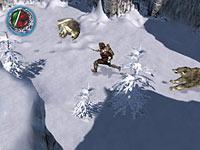
But that's beside the point of this post. My point is that one of the concepts of narrative theory is the storyworld. It's really big in theories that explore the function and interactive nature of video games in particular. If you've ever read a book set in a place that you didn't recognize (which is most books) or played a video game, you've got an idea of what narrative theorists mean by storyworlds.
Rawdon Wilson describes how the axioms of a storyworld contribute to the kind of story you get. He uses a parable of two brothers who tire of reality and reimagine it to describe what happens in the use of storyworld axioms. The first brother creates his world by inventing counterintuitive propositions and accepting the axioms that would grow from them. This is what science fiction or fantasy is often seen to do - to take a proposition and follow it to its logical conclusion.
 The second brother employed a code of normality which was interwined with a code in which anything might happen in his creation of a new imaginative world. This is magic realism. These brothers eventually become difficult to tell apart in their creation of new worlds to their followers.
The second brother employed a code of normality which was interwined with a code in which anything might happen in his creation of a new imaginative world. This is magic realism. These brothers eventually become difficult to tell apart in their creation of new worlds to their followers. Now, obviously Wilson's definition leaves out the third kind of storyworld, where the writer (a third brother so to speak) reproduces the recognizable world, even if it is part of the world that is unfamiliar to the writer or his readers. But that probably goes without saying.
 I got thinking about storyworlds after I had a very strange experience this weekend. At one point, within a small group, we were talking, not about anything in particular, but just the kind of banter that happens when friends get together. Anyway, someone said something, and my first thought was to relate it to the storyworld I've been creating in this novel writing endeavour. I almost opened my mouth, because it made so much sense to me to say what I was going to say. But I stopped myself before saying anything by realizing what seemed very real and logical to me, the creator of this storyworld, would be incomprehensible to someone who didn't know that storyworld. Had I made a comment that made perfect sense for me buried in this world I'm creating, it would have sounded like sheer idiocy to anyone else.
I got thinking about storyworlds after I had a very strange experience this weekend. At one point, within a small group, we were talking, not about anything in particular, but just the kind of banter that happens when friends get together. Anyway, someone said something, and my first thought was to relate it to the storyworld I've been creating in this novel writing endeavour. I almost opened my mouth, because it made so much sense to me to say what I was going to say. But I stopped myself before saying anything by realizing what seemed very real and logical to me, the creator of this storyworld, would be incomprehensible to someone who didn't know that storyworld. Had I made a comment that made perfect sense for me buried in this world I'm creating, it would have sounded like sheer idiocy to anyone else.Wilson didn't talk about what happens when fictional storyworlds invade the real one, but it doesn't take much to realize how disastrous it can be when you can't tell the difference between the two.
No comments:
Post a Comment